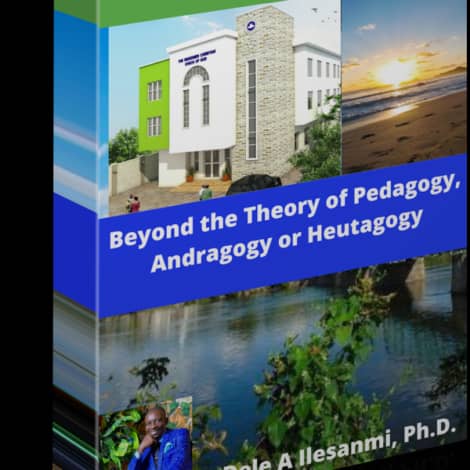Pneumagogy in Christian Education: An Introduction
- By Pastor Dele Ilesanmi, Ph.D.
- Published in Christopress Blog



In his Ph.D. thesis, Dele Ilesanmi (2021)[1] theorises that “the church is a school, a highly organized spiritual educational institution …” He also explains that Christian education is a corpus of biblical truth, oxygen, and vehicle of Christianity without which Christianity is endangered, petrified and atrophied. He opines that teaching is integral to the existence of Christianity[2] and that Christianity is teaching religion.[3] This explains the importance and relevance of Christian education in the church. To buttress this, Walter Norvell (2003) says that Christian education is everything the church does since she teaches in everything she does.[4]
Dele Ilesanmi (2021) defines Christian education as
a process of initiating or introducing the heathen into the culture of the Christian faith, transforming and equipping him through the power of the Holy Spirit with the sole aim of bringing him into the right relationship with God and his neighbours through Jesus Christ to impact his society/world with the instrumentality of the Bible.[5]
From the above definition of Christian education by Dele Ilesanmi, if the church is prepared to fulfil the purpose of God on earth, the role of the Holy Spirit must not be downplayed. In his own view, Williams brilliantly posits, as cited by Dele Ilesanmi that:
Christian education is Christian when teachers and learners are dependent on the work of the Holy Spirit in the learning environment. It is Christian when the purpose and goals are honoring to the Lord and to his kingdom. It is Christian when the curriculum is developed from the teachings of the Word and from an understanding of biblical theology. It is Christian when there is an overall understanding and perspective that God is in control and that teachers and learners are sincerely seeking to fulfill his will and purpose in all things.[6]
Ilesanmi posits that authentic or true Christian Education should be theocentric, Christocentric, and pneumatocentric.. Besides, teaching and learning should be put under the leadership and control of the Holy Spirit which he calls “pneumagogy” in his Ph.D. work[7]. We must understand that the Christian education discussed here covers all the Christian activities and plans in the church, ministry, schools, and Christian theological institutions, and all other associated Christian works and ministries with no exception.
With the benefit of highlights, therefore, the church, the theological learning institutions, and all Christian ministries must rediscover the role of the Holy Spirit in teaching if they are to fulfil the purpose of God in this present world. Norvell Walter (2003) writes:
For the Christian, learning is not merely academic or rational. While academic skills can be useful and while God redeems us totally, body, soul and mind, the Holy Spirit work is the transformational agent in the teaching-learning process. The Holy Spirit works through teacher, learner, environment, methods, and content (the Bible). He brings both conversion and maturation (a process) to the disciple of Jesus.[8]
It is no more news that change is constant. The emerging technological world makes it more compelling and normative. The change applies to all things with an exception to God and His word. God does not change[9] and His word too. God’s word is timeless and changeless[10]. The word of God is yea and Amen[11]. And it is settled forever, nothing can change it[12]. The word of God suits and applies to all situations in every season, time, or period. The word of God is a reliable and veritable tool for survival, creating peace, progress, and development. What we need now is a concomitant paradigm shift in our educational and training methodologies that will engender a concomitant paradigm shift in our thinking, tilting towards appropriating the word of God in our daily life under the guidance of the Holy Spirit. This is the exact springboard this writer is trying to provide through a theological educational teaching-learning approach which he calls “Pneumagogy or Hagiospneumagogy” with a framework to think about the teaching-learning process beyond “pedagogy” and “andragogy” but as “pneumagogy” without which education cannot be said to be Godly and Christian. This is because the content of Christian education (the Bible) is birthed by the help of the Holy Spirit, God’s breath, to adequately prepare a man and make him useful for the divine assignments he has come to do on earth:
16 All scripture is given by inspiration of God, and is profitable for doctrine, for reproof, for correction, for instruction in righteousness: 17 That the man of God may be perfect, throughly furnished unto all good works (2Tim.3:16, 17)
We can simply define Pneumagogy as the art of leading people through teaching (preaching, training, coaching, mentoring, etc.) under the direction or control of the Holy Spirit. It is the method of teaching and practice in Christian (theological) education
This theory is based on the following five biblical theological Theories/facts:
God or Christ-centredness: All instructions must be God/Christ-centred for a person to fulfil the purpose of God for his/her life. All thoughts, knowledge, teachings, or instructions must be subject to the obedience of Christ our God.[13] All our children must be taught by God[14] because the earth must be filled with the knowledge of Him[15]. Only God can give true wisdom, knowledge, and understanding[16], and the Holy Spirit remains as the Teacher[17]. The major function of the teacher is to relate to the Master Teacher, our Lord Jesus Christ.
The Word of God or Biblicality: Learning must be rooted in the Word of God. Any instruction or teaching that is not rooted in the Word of God cannot be considered true or genuine learning. This is because the written Word or the Scripture is given to man by God through His supernatural divine influence (inspiration of God) for teaching, training, mentoring, coaching, instruction, reproof, and correction, in righteousness so that the children of God will be perfect, well-informed, skillful, intelligent, holy, and thoroughly prepared, furnished or equipped unto all good works[18]. Jesus confirmed that the Word belongs to the Father[19]. Therefore, the word must be appropriated by the teachers to facilitate the teaching-learning process to engender better life for themselves and their students. This, will, in turn, positively better a lot of society. Therefore, learning and teaching must be Bible-based.
Holy Spirit-enabling/ centredness: As a person grows up, he/she must learn how to depend on the Holy Spirit who teaches all things and brings all things to our remembrance[20]. The Holy Spirit is the third person in the Trinity. He is God living in us. He is the Teacher of this dispensation. Thus, He must not be ignored in the teaching-learning environment. No Christian educator can successfully impart lives without the help of the Holy Spirit. He is the Spirit of the truth; He lives in us; He is with us[21]. The role of the Holy Spirit cannot be underrated in the teaching-learning environment. He does many things: He teaches; He empowers; He helps; He brings things to our remembrance; He guides; He leads; just to mention a few. With this in mind, no spiritual man or teacher can ignore Him. Any education that is not under the control of the Holy Spirit will cause the receiver confusion, calamity, unrest, and sorrow. The Holy Spirit is the Teacher. The maxim that “experience is the best teacher” is not true. No doubt, experience has its place, it cannot teach you all things but the Holy Spirit can. Therefore, He, the Holy Spirit is the best Teacher.
Prayer: prayer is vital to the success of the teaching-learning process in Christian education. Prayer is communication with God which includes praising and worshipping God in spirit and in truth (John 4:23-24) and asking God your desires in the name of Jesus (John 14:13-14). Asking God for wisdom, knowledge, and understanding will help to receive the correct interpretations of God’s word. This will help both the teachers and students to enjoy similar wisdom and understanding God gave to Solomon ( 1Kings 4: 29-34; 5: 12) and the excellent spirit, knowledge, and understanding He gave to Daniel ( Dan.1:20; 5: 12, 14; 6:3). Only God can give true wisdom, knowledge, and understanding, and this sound, true wisdom is for the righteous (Prov.2: 6, 7). Therefore, we need to ask God for this in prayer (Matt.7:7). Prayer is essential to the teaching-learning process.
Faith: This is the vehicle that we need every day of our life for our desires to be accomplished and to please our Maker, God (Heb.11:6). It is through faith that the worlds were framed by the word of God (Heb.11:3). It is a vehicle that conveys the word of God to its destination when appropriated. It retains the word of God in the hearts of the students/ congregation. It helps us to apply our knowledge rightly through the power of the Holy Spirit. No success can take place in the teaching-learning environment without the faith-filled word and the Holy Spirit’s empowerment. Christian learning environments must be faith-filled before a successful teaching-learning process can take place.
Footnotes:

[1] Dele Ilesanmi(2021) titled his unpublished Ph.D thesis “An Evaluation of Accountability in Christian Education in the Redeemed Christian Church of God, Nigeria”
[2] Ibid.pp. 24-25 see also Ilesanmi, D.A, “Christian Education for Practical Christian Living: John 14:6 Principle for Christian Youths”. A paper presented at the Youth Programme of RCCG, New Things Parish on 27th October, 2013, Basiri, Ado-Ekiti, Ekiti State.
[3] Dele Ilesanmi(2021), op.cit
[4] Norvell, Walter H., “The Great Commission Imperative of Teaching: Why Christian Education Should be on the Cutting Edge of the Church’s Mission Today” in Journal for Baptist Theology and Ministry Vol. 1 No.2 (Fall 2003) 94-106
[5] Dele Ilesanmi(2021), op.cit.p.6
[6] Dele Ilesanmi(2021), see also Williams, Dennis E, “Christian Education” pp.639-643 in Horton, David(ed.), The Portable Seminary, op.cit., 641-642
[7] Dele Ilesanmi mentions the concept “pneumagogy” first in his Ph.D work in 2021
[8] Norvell, Walter H (2003), op.cit.
[9] Malachi 3:6; Heb.13:8; James 1:17; Num.23:19;
[10] Isa. 40:8 ; Mark 13:31
[11] 2Cor.1:20
[12] Psalms 119:89
[13] 2Corinthians 10:5
[14] Isaiah 54:13
[15] Hebrew 2:14;Isaiah 11:9
[16] Proverbs 2:6, 7
[17] John 14: 26
[18] 2Timothy 3: 16-17
[19] John 14: 24
[20] John 14:26
[21] John 14: 17
Share this:


This is good.